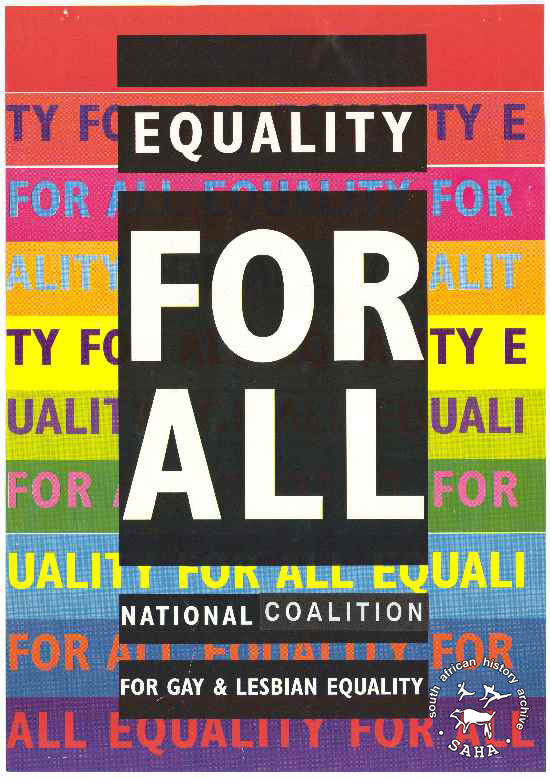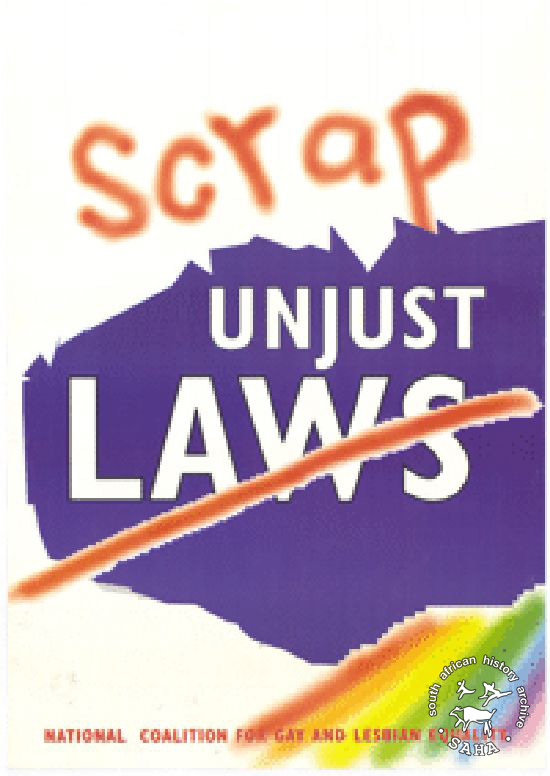
Heritage month is a time to consider all the people, identities and cultures which form part of South Africa. Although heritage is inclusive of everyone today, historically and within archives equal exposure is not common. For example LGBTI histories have only recently begun being celebrated however where there are archival records they are primarily white and male dominated.
One of the SAHA archival interns decided to attended a panel discussion on the 15th of September on “seeking and making LGBTI Archives” hosted by Wits Institute of Social and Economic Research (WISER). Beyond our Gays in the Apartheid Military (AL2878) and specific posters in the SAHA poster collection (AL2446), the SAHA archive has limited LGBTI collections. This is due to GALA originaly being an indipendent project housed within SAHA in the 1990's. For this reason SAHA has not focused on LGBTI resources.
The panel discussion provided an opportunity to think about and consider marginalised histories in the archive. It is good to question the space of our archive in South Africa’s history and which narratives are heard and which are silenced.
The pannelist who stood out
The presentation that stood out for me was the one by Jabu Pereira, founder and director of the recently established Iranti-org archive. The archive’s name is poignant as it means memory in Yoruba. The Yoruba people from Nigeria consider memory a prized form of intelligence. Seldom does the name of an archive so encapsulate the content it curates. ‘Traditionally’ an archives name is associated to an institution or place or a prominent funder or collection they house. This archive is envisages the use of media as a key platform for lobbying, advocacy and educational interventions across Africa. It is an archive for queer memory.
Iranti-org is actively seeking out and creating material that is relevant to creating visibility of Queer people in both urban and rural South Africa. This project is ambitious but also at the same time relevant to bringing forward the silenced voices in both South Africa and Africa. This leaves me questioning if being a representative archive in South Africa today does not require the archivist to participate in active collection development, especially where one is able to see silences in the archive. This active engagement rather than the easier option of relying on materials being given by donors who have material the donor believes is relevant.
In a multi-racial and complex cultural society like South Africa, as an archivist, I believe one has to constantly question one’s role within the archive. Of vital importance, particularly in a country which struggles with its own history and memory due to poor education and the traumatic nature of our past, is to make history accessible. The traditional archive under apartheid or the colonial archive would marginalize, dismiss as irrelevant and limit the documentation of the histories of the majority of the South African population.

My feedback and thoughts on the other pannelists
The other four speakers each had interesting comments from their experiences with archives. An English researcher, Matt Cook, looked at how British archives are changing by making Queer collections accessible and visible, where before they were hidden or difficult to access.
This point was echoed in the discussions of the Gay and Lesbian Memory in Acttion (GALA) archivist, Linda Chernis and Cynthia Kros ofWits History Workshop. Cynthia, while not directly linked to LGBTI topic discussed the silences of collections. She discussed this in reference to a British Colonial documenting Zulu culture in the late 19th Century. What stood out for me here was the relationship she highlighted between the documenter and documented. In recent archival theory and practice there is a lot of literature surrounding the individual or group gathering the information, especially when it comes to oral history interviews. The researcher or compiler has to interrogate their positionality and power which they are imposing on the narrative.
While most of the panelists’ discussions focused on the precariousness of Queer archives, Michele Pickover from Historical Papers, painted a very dark picture on the work of GALA as an archival project. It may have been intended to be giving constructive criticism to promote growth and active discussion. I got the impression the history between the archives was what prompted the topic of the presentation which resulted in the weak and petty critique. This is disconcerting as archives can be such a vulnerable space that attacking each other is really not productive and I believe detrimental to the future of our archives.
A point which I disagreed with was one panelist’s assertion that it was irresponsible for an archive not to have the safety of an institution and engage in projects outside of the archive. The problem historically of ‘fringe’ or alternative collections, is that they are less likely to be seen as relevant by institutions at the time. While there are often benefits of association to large long lasting institutions, the institution will often play an active part in the mandate of the archive. Private and NGO archives are able fill a gap where the larger institution is either failing or not acknowledging histories as relevant. This gives the archive more autonomy in keeping to its collection mandates especially in LGBTI resources.
Concluding remarks
What I enjoyed about attending this discussion was that it made me think about what it means to work as an archivist in the archive. The role of the archive in society is a changing one and it if archivists and archives do not frequently question themselves within the context of South Africa and Africa they will inevitably lose something of themselves. It highlighted the importance of constantly questioning your own assumptions when it comes to the collections one is working with.








